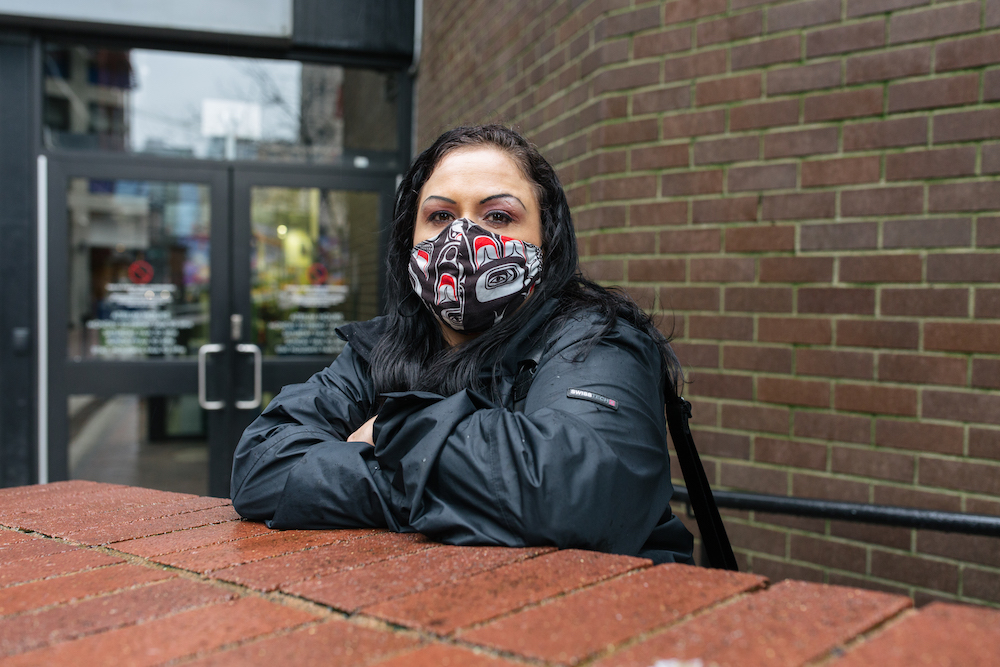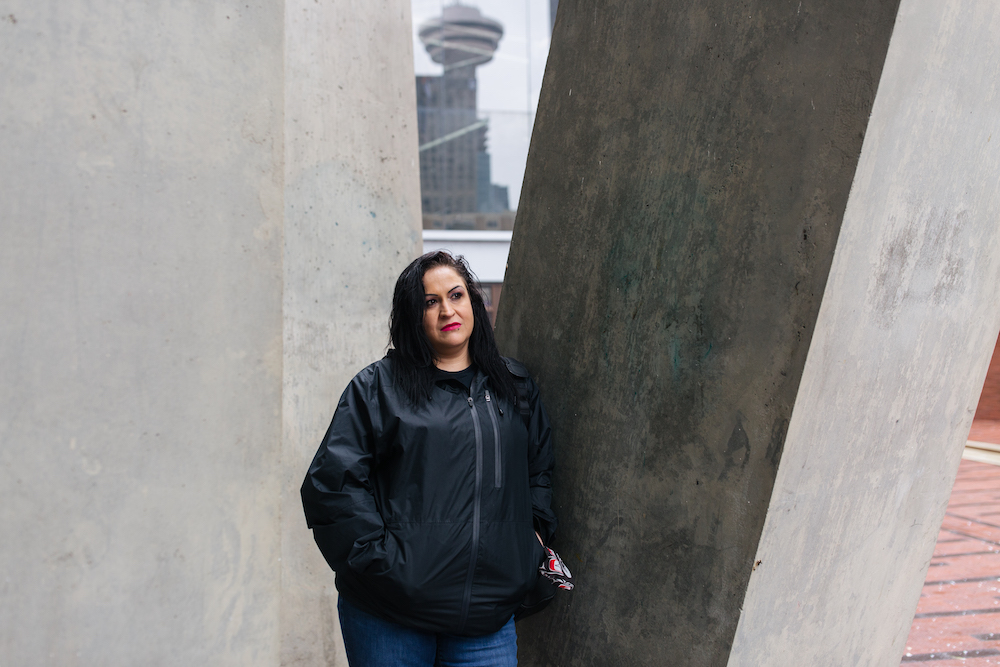It’s been almost a year and a half since Angel Gates submitted her application for the ‘60s Scoop class action settlement.
The $875-million settlement, announced in August 2018, came after a class action suit was filed against the Canadian government on behalf of survivors of the “‘60s Scoop.”
The ‘60s Scoop refers to government apprehensions that took tens of thousands of Indigenous children from their families between 1951 and 1991. The children were made wards of the state or adopted into non-Indigenous families.
Although many Métis and non-status First Nations children were also removed from their families, the settlement only covers Inuit and status First Nations people.
Gates, now 43, was removed from her Haida family when she was nine. She is one of nearly 35,000 people who have applied for compensation.
While 14,500 people have been approved to receive initial payments of $21,000, Gates is among the nearly 9,700 people still waiting to find out if they are even eligible to be compensated for their “loss of culture and language.”
“I’ve watched all of my friends, who I told about it and applied around the same time as me, get theirs,” said Gates, who lives in Vancouver’s Downtown Eastside.
Yet despite repeated emails and calls to Collectiva, the class action service company tasked with reviewing applications, and to lawyers at Klein Lawyers, the law firm handling B.C. applicant questions, no one will tell Gates why she is still waiting.
“It’s just keeping people stuck in their stuff, I think it’s really cruel,” said Gates, who applied just before the September 2019 deadline because of the trauma of reliving abuse she faced while in foster care.
“I would start crying again about this stuff. I think about it all the time now — I think I had it buried pretty deep.”
The settlement website directs survivors struggling with the trauma of reliving their experiences with the ‘60s Scoop to call a mental health hotline. But it is not specific to the ‘60s Scoop, and Gates doesn’t think it will help her.
In an email to The Tyee, a spokesperson for Argyle PR, the public relations firm hired by the federal government to communicate with applicants and the media, blamed both the pandemic and the need to gather more information from some applicants for the delay.
“It is also important to note that not every claim will follow a straight path from assessment to approval or denial. Some claims will be assessed and re-assessed more than one time, as new information is requested and received,” the spokesperson wrote, adding claims are reviewed in the order they were received.
Grand Chief Stewart Phillip of the Union of BC Indian Chiefs applied for compensation at the same time as Gates. He hasn’t heard anything about his application either.
“I keep going to the mailbox, peeking in there, expecting a big red ribbon letter from Trudeau,” said Phillip.
But he’s not surprised.
“I think the Trudeau government is notorious for making grandiose public announcements about decisions that will provide benefits for various groups of Canadians, and then there isn’t any follow through,” he said. Phillip said he plans to raise the delays with the UBCIC.
“All we’re left with is the grandiose announcement, and any political mileage he gets out of making those announcements.… Instead of attending to his legal outstanding commitments, he keeps sinking money into that dead horse Trans Mountain pipeline project.”
Phillip, who referred to himself as “somewhat upwardly mobile,” is not depending on the compensation to stay financially afloat.
But given the pandemic, he says many people are depending on that cheque to make ends meet.
People like Dean, a member of the Mamalilikulla First Nation on what is now B.C.’s central coast and a red seal pipefitter who lost his job shortly after the pandemic began. The Tyee agreed not to publish his last name for privacy reasons.
A ward of the state from age seven, Dean grew up in non-Indigenous foster homes. Similar to Gates, he applied for compensation in September 2019.
Dean planned to use the $21,000 interim settlement payment to pay off his truck loan. He was ineligible for the Canada Emergency Response Benefit because his layoff was not directly caused by the pandemic.
He’s had to survive on his savings and employment insurance, until earlier this month when he started a job pouring concrete, a job Dean finds especially physically taxing for a 48-year-old.
“It’s good for a young man, it’s not good for men my age. But in order for me to make money to survive, this is what I have to do right now.”
Now he needs the settlement money to make up for a salary that’s barely half of what he would be paid as a pipefitter.
But his settlement application has been “under review” since August. In December, Collectiva said it was still reviewing his file.
“I check my mailbox each day thinking, ‘OK, if the cheque’s here, I’m going to quit my job,” he said, adding he’s behind on credit card payments and will soon default on his truck payments.
Dean has a sister and a friend who applied for compensation after he did. They’ve both been approved and have received their interim payments of $21,000.
“I just don’t understand why it has to take so long,” he said. “I just hope to hear something one of these days.”

Not only are people waiting to find out if they are eligible for compensation, but Collectiva has suspended all rejections of applicants during the pandemic because it is the “safe and fair thing to do,” according to a spokesperson’s email to The Tyee.
“Social distancing makes it difficult for applicants to get the face-to-face help and support they might need to get additional information that supports their applications,” the statement read.
“A lot of the information that the administrator needs to assess applications is stored in provincial archives, and many of those archives are restricted to access.”
But Katherine Legrange, co-founder of 60s Scoop Legacy of Canada, which runs seven Facebook pages that serve as online peer support groups for Scoop survivors, says group members have reported being able to access their own child welfare records during the pandemic.
“Folks are saying that they’re able to get their records with one request, so, first of all, why is Collectiva not doing that work? Or the law firms?” she said.
“Secondly, if folks are able to get their own records, I’m not understanding why it’s such a challenge for Collectiva.”
Legrange said the settlement agreement says Collectiva was supposed to assess all applications within 120 days of the Sept. 3, 2019 application deadline. That requirement was suspended in April as a result of the pandemic. Collectiva denies that there was ever a deadline for assessing the applications."*
Lagrange wrote to the law firms involved in December asking for a new deadline, but her request was denied.
The Tyee reached out to Klein Lawyers and Indigenous and Northern Affairs Canada for comment, but both redirected us to Argyle PR.
Legrange believes they are afraid of disqualifying people eligible for compensation if they set a new deadline. “I think they’re afraid that if they disqualify folks, that opens them up to legal action,” she said.
But survivors waiting for their payments can’t wait much longer, she said. Several applicants have passed away while waiting for notice of their applications, including a report of at least one person dying of suicide.
“I really want to stress the need for mental health and wellness support,” Legrange said.
“The money is important for some folks, but it’s really more about being able to wrap this up, so to speak, and move on and heal. I think we all want to have that closure.”
*Story updated on Jan. 28 at 11:13 a.m. to add information on the process for assessing applications. ![]()
Read more: Indigenous, Rights + Justice

















Tyee Commenting Guidelines
Comments that violate guidelines risk being deleted, and violations may result in a temporary or permanent user ban. Maintain the spirit of good conversation to stay in the discussion.
*Please note The Tyee is not a forum for spreading misinformation about COVID-19, denying its existence or minimizing its risk to public health.
Do:
Do not: